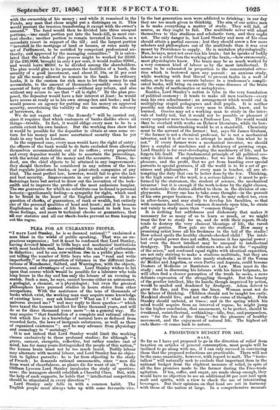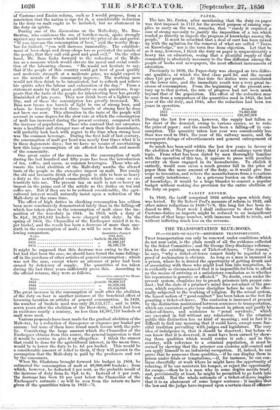A PROJECTOR'S BUDGET FOR 1857.
MALT.
So far as I have yet proposed to go in the direction of relief from taxation on articles of general consumption, most people will be inclined to go along with me, if I can only succeed in convincing them that the proposed reductions are practicable. There will not be the same unanimity, however, with regard to malt. The " teeto- tallers will naturally seek to exclude that important item in the national budget from the slightest measure of relief, in spite of all the fine promises made to the farmer during the Free-trade agitation. If tea, coffee, and sugar, are made cheap enough, they would have no objection to see an additional 50 per cent laid upon malt and spirits, with a view to check the use of intoxicating beverages. But their opinions on that head are not in harmony with those of the nation at large. In a comprehensive measure
of Custoins and Excitie reform, such as I would propose, from a eonviction that the nation is ripe for it, a considerable reduction in the duty on malt ought to be included, but no abatement in the duty on spirits. During one of the discussions on the Malt-duty, Mr. Bro- 'therton, who condemns the use of butcher-meat, spoke strongly against any measure which would lower the price of ale and porter. "If you increase the consumption of beer," said the worthy Mem-
ber for Salford, " you will increase immorality. The establish- ment of beer-shops and dram-shops has so perverted the minds of the people, that they call evil good and good evil." 'On the other hand, Mr. Bass looks forward to the reduction of the Malt- tax as a measure which would elevate the moral and social condi- tion of the labouring classes. "He would not hesitate to say, that if the people of this country could get beer of good quality and moderate strength at a moderate price, we might expect to see the morals of the community improve. The working man . would not then drink to be intoxicated, but to refresh and relieve his spirits after the labour and exhaustion of the.day." From a statement made by that great authority on such questions, it ap- pears that the taste of the people for intoxicating beer has greatly diminished of late years. They now drink beers of a lighter qua- lity, and of these the consumption has greatly increased. Mr. Bass now brews ten barrels of light to one of strong beer, and where he formerly brewed three barrels of strong beer he does not brew one now. This alteration in the taste of the people will account in some degree for the slow rate at which the consumption -of malt has increased during the present century, compared with the increase of population. Those who contend that our, ancestors were a healthier and stronger race of men than their descendants, will probably look back with regret to the time when strong -beer was the common beverage. During the first half of last eentury, the consumption of malt per head was nearly four times what it is in these degenerate days; but we have no means of ascertaining how this large consumption of ale affected the health and morals of the community.
One great cause of the decrease in the consumption of 'rata
during the last hundred and fifty years has been the introduction of tea, coffee, and cocoa, as common beverages. Those who ad- vocate the total abolition of the Malt-duty ascribe the altered taste of the people to the excessive impost on malt. But surely the old and favourite drink of the people is able to bear as heavy a duty as the newfangled commodities which have come so ex- tensively into use. The present tax on malt is not so heavy, an impost on the prime cost of the article as the duties on tea and coffee are. But if they are to be reduced considerably, the agri- cultural interest would naturally insist upon a reduction of the Malt-duty at the same time.
The effect of high duties in checking consumption has seldom
been more i conclusively demonstrated lately than in the falling:off which has taken place n the consumption of malt since the im- position of the war-duty in 1854. In 1853, with a duty of -28. 81d., 36,245,842 bushels were charged with duty. In the spring of 1854, the Chancellor of the Exchequer raised it to 4s. per bushel, and the result has been a decrease of more than one- ' sixth in the consumption of malt; as will be seen from the fol- lowing comparison. Quantities charged
Years. with duty.
• 1853 bushels 36,245,842 1854 1, 31,869,127 1855 „ 30,199,776
It might be supposed that this decrease was owing to the war : but had that been the case, we should have found the same falling- off in the purchase of other articles of general consumption ; which was not the ease, except where an advance of price had been caused by deficiency of supply. The quantities of tea taken during the last three years sufficiently prove this. According to the official returns, they were as follows.
Quantities entered for Home Years. Consumption.
1853 pounds 58,860,147 1854 „ 61,970,341
• 1855 63,454,036
The great increase in the consumption of malt after the abolition of the duty on beer is another instance of the beneficial effect of lessening taxation on articles of general consumption. In 1829, the number of bushels used was only 29,153,177 ; and in 1836, seven years after the abolition of the Beer-duty, which had been in existence nearly a century, no less than 44,387,719 bushels of malt were used.
Various proposals have been made for the gradual abolition of the Malt-tax, by a reduction of threepence or sixpence per bushel per annum : but none of them have found much favour with the pub- lic. Considering the large amount which the Chancellor of the Exchequer obtains from this source, the general impression is that it would be unwise to give it up altogether. I think the utmost that could be done for the agricultural interest, in the -mean time, -would be to lower the duty to 1s. 4d. per bushel. This would be a considerable amount of relief to them, if they will persist in the assumption that the Malt-duty is, paid by the producers and not "by the consumers.
When Mr. Gladstone brought forward his budget in 1854, he estimated the consumption of malt at 40,000;090 bushels ; from which, however, he deducted 5 per cent, as the probable result of 'the increase of duty from 2s. 8id. to 4s. Instead of 5 per cent, the decrease has been 25 per cent below the Chancellor of the 'Exchequer's estimate ; as will be seen from the return we have given of the 'quantities taken in 1853—'5.
PAPER.
The late Mr. Porter, after mentioning that, the duty; on paper was first imposed in 1711 for the avowed purpose of raising sup- plies to =try on the war, remarks, that surely it required a case of strong necessity to justify the imposition of a tax which tended so directly to impede the progress of knowledge among the people." It must be admitted that a deal of cant has been mixed up with the agitation.for the removal of what are called "Taxes on Knowledge," nor is the term free from objection. Let that be its it may, however, I think the duty on paper is unquestionably a heavy tax on education, seeing that a plentiful supply of that commodity is absolutely necessary to the free diffusion among •the people of books and newspapers, the most efficient instruments of education.
- Previously to 1836, the Paper-duty was -charged on two differ- ent qualities, of which the first class paid 3d. and the second class lid. per pound. At that date the duties were assimilated at the lower rate, and the immediate result was a very great in- crease of consumption. From the beginning of the present cen- tury up to that period, the rate of progress had not been much beyond that of the population. The effect of the reduction may be seen from a comparison of the quantities used in 1835, the last year of the old duty, and 1845, after the reduction had been ten years in operation.
Years. Pounds.
1835 74,042,650 184.5 „. 124,247,070
During the last few years, however, the supply had fallen so far short of the demand, owing to various causes, as to raise the price of paper ; and the result has been a falling-off in con- sumption. The quantity taken last year was considerably less than was used in 1845, the year of the railway. -mania, and the consequent deluge of advertisements and general enlargement of newspapers.
So muck has been said -within the last few years in favour of the abolition of the Paper-duty, that I need not enlarge upon that topic. From what has been stated by men thoroughly familiar with the operation of this tax, it appears to press with peculiar severity on those engaged in its manufacture. To abolish it entirely, Would soon cause a much greater fall in the price 'of paper than the mere amount of the duty, as it would give free scope to invention, and relieve the -manufacturers from a•vexatious and costly interference. As a grievous burden on the diffusion of knowledge, it would be a luge blunder to concoct a popular budget without making due provision for the entire abolition of the duty on paper.
TARIFF REFORM.
In 1840, the tariff comprised 1052 articles upon which duty was levied. By Sir Robert Peel's measure of reform in 1842, and other minor reductions: in 1846-'7-'8, this long list has been re- duced to 466. Next week I shall endeavour to show that the Customs-duties on imports might be reduced to an insignificant fraction of that large number, with immense benefit to trade, and without inflicting much loss on the revenue.



























 Previous page
Previous page